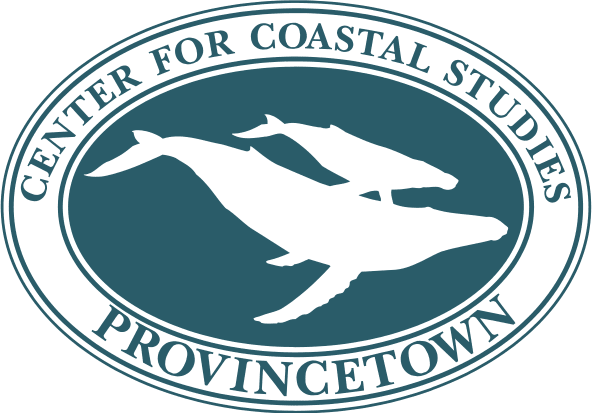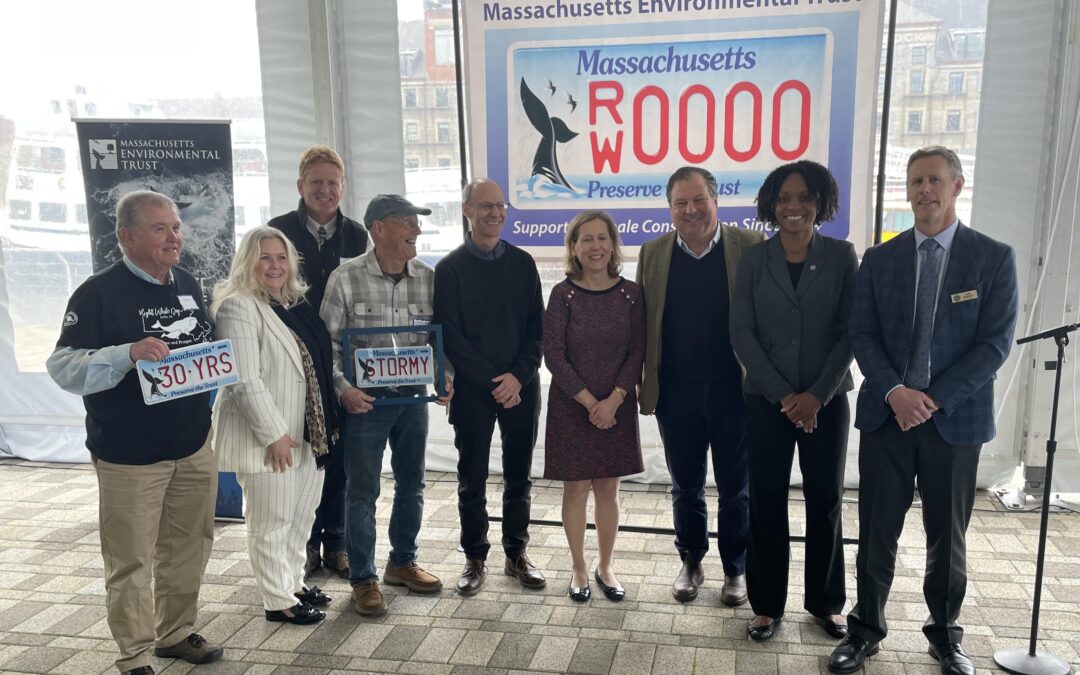In a special event at the New England Aquarium in Boston on Wednesday, government agencies and organizations dedicated to the protection of the North Atlantic right whale came together to mark the second annual Right Whale Day.
Director of the Center for Coastal Studies’ Right Whale Ecology Program, Dr. Charles “Stormy” Mayo, was honored for his decades of pioneering work in this cause. Stormy was presented with a citation from the state legislature by State Senator Bruce Tarr, who noted that the right whale is Massachusetts’ state marine mammal, and as such, “our special responsibility.”
The event also marked the 30th anniversary of the Massachusetts Environmental Trust’s Right Whale /Roseate Tern license plate, the first specialty license plate to benefit conservation. Colleen Ogilvie, Director of the Registry of Motor Vehicles, presented Mayo with a special edition of the license plate that read simply: “STORMY.”
The event highlighted the combined efforts of many organizations and government agencies to protect right whales. Participants in the event included the Executive Office of Energy and Environmental Affairs, The Massachusetts Department of Fish & Game and Division of Marine Fisheries, the Massachusetts Environmental Trust, The New England Aquarium, the State Legislature, and the Center for Coastal Studies.
Mayo thanked the many collaborators who are working so closely together, and credited a “high level of dynamic management…. These whales will not be saved unless all these partners are working together in lockstep,” he said.
Massachusetts Division of Marine Fisheries Director Dan McKiernan also credited the collaboration between fisherman and conservationists, as well as research by the Center, for making progress in the protection of right whales. “We now have a robust understanding of how right whales move through Massachusetts waters.” Such knowledge, he said, has led to policies that “dramatically decrease the risks that right whales face.” But, he added, “If this season has taught us anything, it’s taught us that we’re not done.”
Among the many speakers was Matt Delaney, whose first encounter with a right whale inspired him to call for the establishment of Right Whale Day.
“When you have a 50-ton creature swim within 20 feet of your car [at Race Point], raise its super-huge black head, and open an eyeball the size of a softball and look at you, it’s something you’ll never, ever forget,” said Delaney, who sported a Center for Coastal Studies Right Whale Day T-shirt.
“This work is incredibly urgent,” said Dr. Letise LaFeir, Chief of Conservation and Stewardship at the New England Aquarium. “Today and every day, we encourage the public to learn more about this critically endangered species—and how human impacts, particularly vessel strikes and entanglements, are causing the right whale population to decline,” she added.
In concluding his remarks, Mayo reflected on the plight of the North Atlantic right whale in what is now “an urban sea,” and our responsibility for its protection:
“Though we are slowly coming to understand how to better manage human activities in the urban sea, we must remember that these ancient creatures, the right whales, have adapted to an ocean that was once their domain, where over the millennia, they swam freely across the wide reaches of the Atlantic.
That ocean was silent, but for the sounds of wind and waves and the calls of animals. That sea was unbounded and change was slow, and the whales were capable of adapting. Today it is not their domain, it is a place filled by industrial noise, walled by nets and ropes, and changing rapidly under the onrushing force of climate change. Today’s sea is no longer theirs, it is ours, and I believe that this Right Whale Day recognizes our critically important responsibility to the ocean ecosystem and to the last of the right whales.”

